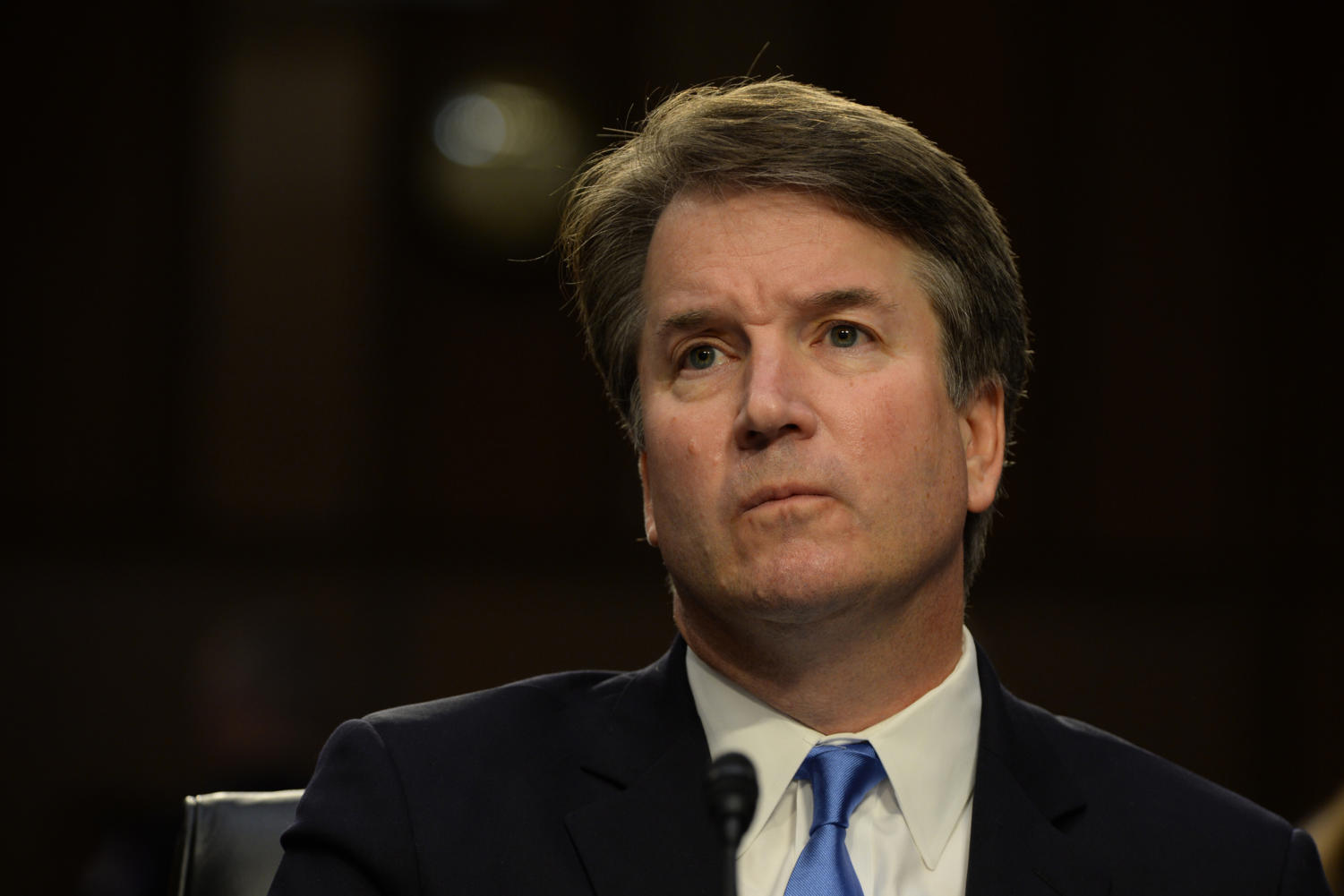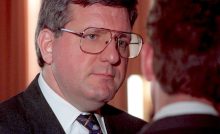Kavanaugh sticks to his position on guns, dodges questions about abortion, presidential power


Supreme Court Associate Justice nominee Brett Kavanaugh at his confirmation hearing before the Senate Judiciary Committee in the Hart Senate Office Building in Washington, D.C., on Wednesday, Sept. 5, 2018. (Christy Bowe/Globe Photos/Zuma Press/TNS)
WASHINGTON — Judge Brett Kavanaugh on Wednesday defended his broad view of gun rights and restrictions on abortion for young immigrant women, but refused to say whether a president can be ordered to answer questions in a criminal investigation.
Facing senators during a second day of his confirmation hearing, President Donald Trump’s Supreme Court nominee proved adept at giving lengthy answers to questions without revealing his views on matters of controversy.
“You’re learning to filibuster,” Sen. Dianne Feinstein, D-Calif., told him when he steered around her question on whether the president is shielded from being investigated or questioned while in office.
In law review articles in 1998 and 2009, Kavanaugh said the president “should be excused from some of the burdens of ordinary citizenship while serving in office” and should not be subject to investigations or questioning. The “Constitution seems to dictate” that Congress, not a special prosecutor, should investigate a president for lawbreaking, he wrote.
But when pressed repeatedly by Democrats on Wednesday, Kavanaugh contended that he has never taken a position on whether indicting or investigating a president for criminal wrongdoing is constitutional.
The issue has taken on new significance because Trump is caught up in special counsel Robert S. Mueller III’s investigation of Russian interference in the 2016 election and could be called to answer questions from a grand jury.
Senate Judiciary Committee Chairman Charles E. Grassley, R-Iowa, joining other Republicans in trying to help the nominee articulate his views, asked Kavanaugh “whether you have any trouble ruling against a president who appointed you.”
“You’re correct. No one is above the law in our constitutional system,” Kavanaugh said, who answered senators’ questions beginning at 9:30 a.m. until well into the evening. “The executive branch is subject to the law, subject to the court system.”
But when Feinstein asked, “Can a sitting a president be required to respond to a subpoena?” Kavanaugh would not answer. “That’s a hypothetical question,” he said. “I can’t give you an answer to a hypothetical question.”
He did, however, endorse as correct the Supreme Court’s 1974 ruling in United States vs. Nixon, which required President Richard Nixon to turn over the Watergate tapes. It was “one of the greatest moments in American judicial history,” he said.
But he refused to give a similar endorsement for the 1973 ruling in Roe vs. Wade, which established a woman’s right to abortion. Feinstein tried to get him to say whether the ruling was correct, and Kavanaugh said only that it was entitled to respect as a precedent.
Most legal experts predict that Kavanaugh, if confirmed, will provide the fifth conservative vote on the court to restrict abortion rights or overturn Roe. During his campaign, Trump promised to appoint only judges who would vote to overturn the abortion ruling.
But Kavanaugh seemed eager to raise some doubts. “I understand the significance on the issue,” he said Wednesday. “I don’t live in a bubble. I live in the real world.”
Kavanaugh noted several times that the 1973 decision had been repeatedly affirmed, and that a 1992 ruling in Planned Parenthood vs. Casey, which affirmed much of Roe, in effect created a “precedent on precedent.”
And he made an analogy to the late Chief Justice William H. Rehnquist’s decision not to overturn the so-called Miranda rights disclosure requirement for criminal suspects. Rehnquist had long opposed the Miranda ruling, but then decided it was too late to overturn it. It’s also true, however, that Rehnquist found ways to narrow the ruling’s impact.
Kavanaugh’s remarks about Roe may have been largely directed at two female Republican senators, who support abortion rights and whose votes will be key to Kavanaugh’s confirmation. Sens. Susan Collins of Maine and Lisa Murkowski of Alaska have not announced how they will vote.
But Kavanaugh gave no assurances about how he might vote, and nothing he said would prevent him from voting to restrict abortion rights on the court. Many Supreme Court nominees speak about the importance of respecting precedents, and then once on the court vote to overturn them.
Feinstein, for now, seem unsatisfied. “We can’t accept vague promises from Brett Kavanaugh when women’s reproductive freedom is at stake,” she said on Twitter.
Last fall, Kavanaugh was involved in a dispute over whether a migrant teenager in Texas could be released from immigration custody to obtain an abortion. A federal judge cleared the way, but Kavanaugh wrote a 2-1 decision siding with Trump administration lawyers and blocking the abortion for up to 10 more days. The full appeals court intervened and overturned his ruling. In dissent, he faulted his more liberal colleagues as wrongly creating a “new right for unlawful immigrant minors in U.S. government detention to obtain abortion on demand.”
He defended that ruling Wednesday, stressing that the girl was 17 and not yet an adult. “If she had been an adult, she would have had a right to obtain an abortion immediately,” he told Sen. Richard J. Durbin, R-Ill.
Durbin rejected the distinction, noting that the teenager had appeared before a state judge in Texas who decided she was sufficiently mature to make the decision on her own.
On guns, Kavanaugh stuck fast to his support of a broad Second Amendment right to possess a semiautomatic rifle with a large magazine of ammunition.
He dissented alone in 2011 when the U.S. Court of Appeals for the District of Columbia Circuit upheld a D.C. ordinance that prohibited semiautomatic “assault weapons.”
Three years before, the Supreme Court in District of Columbia vs. Heller struck down a law prohibiting possession of a handgun at home and established a Second Amendment individual right for gun ownership.
Feinstein asked why Kavanaugh believed semiautomatic weapons could not be banned, when appellate judges across the country had upheld such restrictions.
“I had to follow precedent,” Kavanaugh replied. He said former Justice Antonin Scalia said the Second Amendment did not protect weapons that are “dangerous and unusual,” and semiautomatic rifles are not unusual, he said. They are “widely possessed” by millions of gun owners, he said.
Kavanaugh did not back off, even when Feinstein spoke about the wave of mass shootings at schools using assault weapons.
On the question of presidential power, Kavanaugh said that “no one is above the law,” as one would expect any nominee to say.
But he declined to answer questions about whether Trump could pardon himself or pardon someone in exchange for an agreement not to testify against him, saying those were “hypothetical” questions that he couldn’t answer without potentially prejudging issues that might come before the courts.
Sen. Patrick J. Leahy, D-Vt., confronted the nominee with what he said was evidence that a Republican staff member during George W. Bush’s administration had supplied Kavanaugh — who was then helping to confirm judges — with information that had been stolen from Democratic files. Leahy said the information detailed what the senator planned to ask nominees during confirmation hearings.
Leahy, whose emails were stolen, quizzed Kavanaugh on whether he knowingly used the stolen documents, noting that Kavanaugh was included in an email chain discussing the information. Kavanaugh said he did not recall. “I don’t really have a specific recollection of any of this,” he told lawmakers. Kavanaugh seemed unprepared for the questions and somewhat flustered.
Leahy said later Wednesday that Grassley agreed to release documents related to the stolen materials, which are now confined only to lawmakers on the committee.
Grassley’s office didn’t make the same pledge. Spokesman Taylor Foy said Grassley would “do his best to accommodate this last-minute request,” adding that waiving the classification would require input from the White House and former President Bush.
Recent Posts
Therese Pitman: Giving back to Pitt’s student-athletes with equality
Pitman is Pitt’s Director of Student Athlete Development where she helps student-athletes navigate their career…
Pitt speech and debate team heads to nationals
The William Pitt Debating Union, Pitt’s speech and debate team, sends students to both in-person…
Visuals: A Year in Review
The visuals desk had an interesting year. In the midst of the 2024 Presidential Election,…
De-stress events across campus offer students a break from studying
During finals week, departments across campus are offering wellness events to help students manage stress…
Pitt students share their summer plans
After a long and strenuous academic year, many students are excited to take a break.…
Column | Collaboration and connection make us better — yes, even in journalism
Today is the last day I will ever do this, and despite the amount of…

